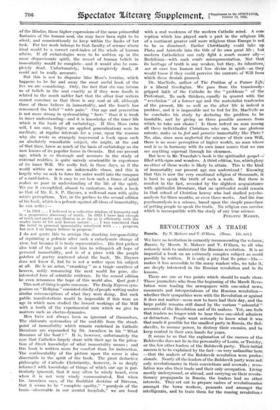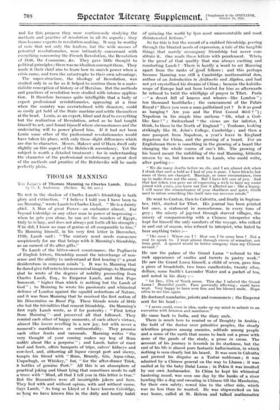REVOLUTION AS A TRADE
Russia. By N. Makeev and V. O'Hara. (Bean. 15s. net.) WE have no hesitation in earnestly recommending the volumei Russia, by Messrs. N. Makeev and V. O'Hara, to all who seriously wish to understand the Russian revolution. It is as impartial a book on an extremely complex subject as could( possibly be written. It is only a pity that its price-15s.- makes it less accessible to the many readers who, we take it, are deeply interested in the Russian revolution and in its lessons.
There are one or two points which should be made clear. Those journalists who from the beginning of the March Revc- lution were loading the newspapers with one-sided news, comments and interpretations of the Russian revolution— whether their sympathies were with the Revolution or against it does not matter—seem now to have had their day, and the large public remains still dazed by the various " colourful accounts of the Revolution and of its makers. Yet, one feels that readers no longer wish to hear those-one-sided admirers, or detractors. People want seriously to know what it was that made it possible for the smallest party in Russia, the Bol-i sheviks, to assume power, to destroy their enemies, and to keep control in their own hands for years.
It seems to us that the explanation of the success of the: Bolsheviks does not lie in the personality of Lenin, or Trotsky,; or the few other leaders of the Bolshevik party. Their initial success is to be explained by the fact—so.very unfamiliar here! —that the makers of the Bolshevik revolution were profes-i sionals. Nearly all the leaders of the Bolshevik party were not only revolutionaries in their convictions and avowals ; revo- lution was also their trade and their only occupation. Living mostly underground, or abroad, and carrying on their revolu tionary propaganda in Russia, the leaders had no other interests. They set out to prepare cadres of revolutionaries amongst the town workers, peasants and amongst the: intelligenZia, and to train them for the coming revolution
Lind for this purpose they were continuously studying the methods and practice of revolution in all its aspects ; they thus became experts in revolution-making. It may be worthy of note that not only the leaders, but the wide masses of potential revolutionaries, were intimately -conversant -with everything concerning the French Revolution, the Revolution of 1848, the Commune, &c. They gave little thought to political principles ; there was no idealism amongst them. They made it their chief aim to learn how to snatch power when a crisis came, and turn the catastrophe to their own advantage,
The super-structure, the ideology of Revolution, was studied only in so far as it helped to confirm them in a mate- rialistic conception of history or of Marxism. But the methods and practices of revolution were studied with intense applica- tion. It therefore becomes quite intelligible that a body of expert professional revolutionaries, appearing at a time when the country was • overwhelmed with, disasters, could so easily get hold of the State machine and settle themselves at the head. Lenin, as an expert, blind and deaf to everything but the realization of Revolution, acted as he had taught himself to act, and found himself where circumstances and the undeviating will to power placedhim. If it had not been Lenin some other of the professional revolutionaries would have taken his place, with only those slight differences which are due to character. Messrs. Makeev and O'Hara dwell only slightly on this aspect of the Bolshevik ascendancy. 'Yet the subject is worth a detailed treatment ; for in understanding the character of the professional revolutionary a great deal of the methods and practice of the Bolsheviks will be made perfectly plain.































































 Previous page
Previous page